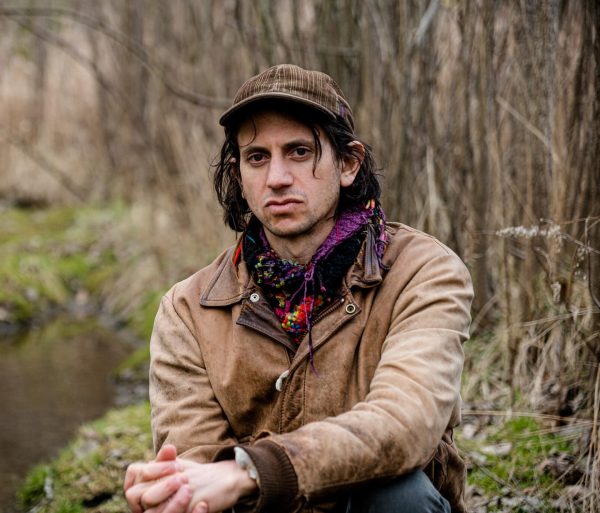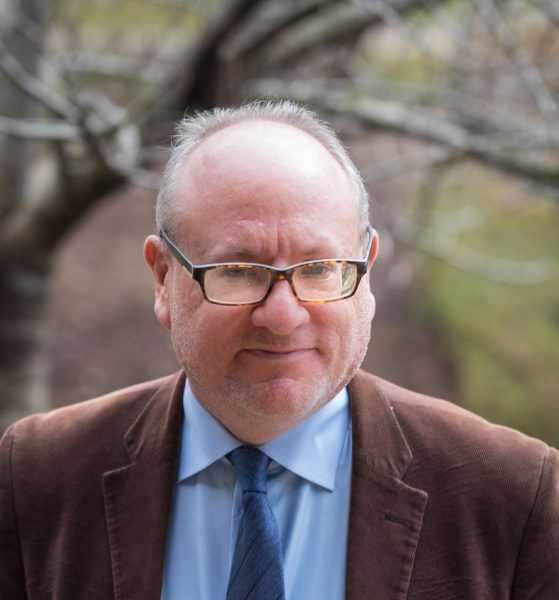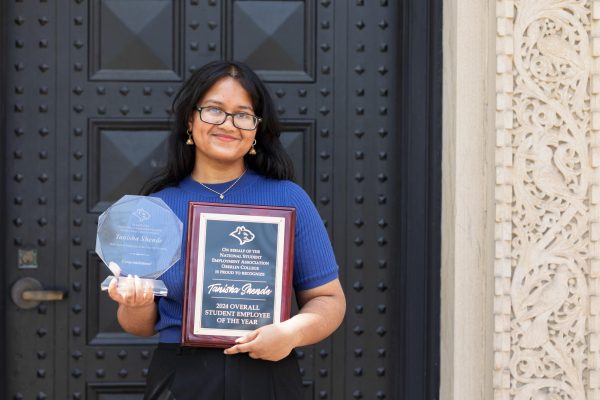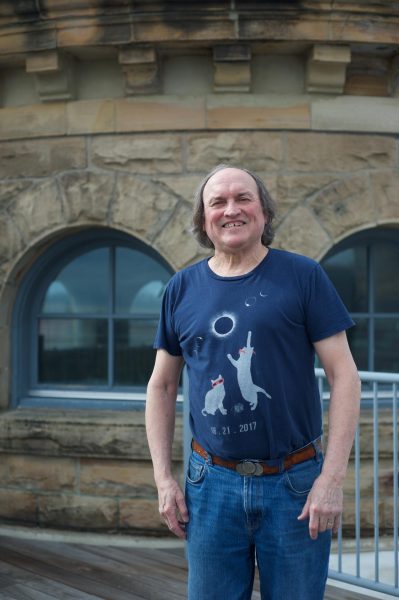OTC: Alex Blumberg, OC ’89, Audio Journalist & Entrepreneur
Alex Blumberg, OC ’89, is an award-winning audio journalist and co-founder of the podcasting company Gimlet Media, which was recently acquired by Spotify for $230 million. Before starting Gimlet, Blumberg worked as a producer for the narrative-based NPR program This American Life and co-founded the show Planet Money. Blumberg came to campus last Thursday, March 5, to talk about how to tell a great audio story, as well as his experience as an entrepreneur and journalist.
What was your time at Oberlin like, and what were you involved in while you were here?
During my time at Oberlin I was a very unremarkable student. I lived in Tank Hall; I drank beer and ate pizza. I went to the disco a lot. And then I graduated. I was a Political Science major. I thought I wanted to be in politics, but I actually don’t like politics. I wanted to make the world run better. The whole time I was here, really what I wanted to be was a journalist, but I didn’t fully know that exactly. Somehow I’d gotten into my head that I could never do that — I don’t know why. I thought of myself as not very talented. I applied for a show at WOBC, and I didn’t get it. I got rejected. I was very mediocre at everything, except I really liked my friends that I had here.
Did you have a moment when you switched from not really considering journalism to wanting to do radio? How did you get to This American Life?
My longtime girlfriend broke up with me, and I was really devastated. It made me reassess my whole life. I felt like I’d been playing it safe my entire life hoping that I wouldn’t have pain because of that. Yet I was in intense pain, and it was a big reassessment. I realized, I guess, playing it safe doesn’t keep you safe, so I might as well just try for what I actually want. And then I went and started applying for things and not getting them and then applying for them again. And I eventually got an internship at Harper’s [Bazaar Magazine]. I was a teacher by this point, so I got paid through the summer, and I knew my parents wouldn’t let me starve. So I knew I had the safety of running up a little bit of a credit card bill because I knew that they were there to bail me out if I needed to. That taught me a lot about how to be a journalist and what people are looking for and how to tell stories.
What’s remarkable about a lot of the pieces that you’ve worked on — from This American Life and then StartUp, and a lot of the shows on Gimlet — is that they’re vulnerable in this very authentic way where you’re opening up to your audience. How do you get used to doing that, and how do you do that well?
Audio is funny. A lot of times I’ll do it the protective way first, and then we’ll listen to it. And you can hear it, you can tell. You have to really mine the thing that you’re afraid of mining. It’s hard. It’s scary at first. But then if you do it right, you’re rewarded for it, because that’s the scary thing about sharing something intimate — it feels like it’s just you, and it feels like it’s this deep, dark secret. And then when you share it, you learn that other people have it. And then it feels like a relief to have it out there and to know other people were feeling that way too. That’s what makes it good. You just have to try to go to that place. Everybody’s trying to position themselves in a certain way, or deflect, or not admit the thing that they’re feeling. As a producer of This American Life, you start to hear it, and you know that it’s not as good. That moment when somebody actually comes clean with themselves is a really powerful moment.
What is it like when you sit and do edits with people?
The way it usually works, it’s sort of like a table read. The reporters come in; they would have the script in front of them. We have the tape on the computer, so the producer has the tape cut, and they’ll read the script, and then they’ll fire the scripted part of the tape. We just do it as a live read. Usually, I’m sitting there just typing notes as fast as I can. It’s always the same issues, which is like: Where were you bored? Where were you confused? Where did you not care what was happening? It’s always the first episode that’s the hardest because you have to make people care. You have to spend a lot of time just trying to get people to care.
How have you been able to balance producing stories even as you’re also working with the business side of Gimlet?
I think my co-founder Matt [Lieber] was incredibly important in that. Podcasts are our product. And I was one of the main people who made that product, so that was always going to be part of what I was doing. I did for a while feel like I needed to get more into the running and the management of things, but I realized that it’s all about, “Where are you adding the most value?” There are people who are actually better managers in a certain organizational leadership kind of way. So I started to try to figure out where exactly am I adding the most value? What I realized is I’m probably adding the most value if I’m working deeply in the making of the thing.
On the topic of making actual podcasts, as big Reply All fans, how do you find the tweets that you bring for “Yes, Yes. No”?
The process has evolved. It started with just me. I came in to them one day, and I was like, “I don’t understand what’s happening, you need to tell me.” And they explained it to me on tape, and it just became a thing. It was really fun, and people liked it. Now it’s a little bit more challenging. Tweets and memes have gotten more and more complicated and multiple levels and narrative. So it’s really hard to figure out ones that actually have like a pretty epic storyline.
What do you read or listen to nowadays if you have time?
It’s really hard for me to listen to anything other than Gimlet rough cuts and Gimlet stories. I want to try to listen to as much of what we’re making as possible. And we’re making more and more, so it takes a long time. I listened to the Dolly Parton series — [Dolly Parton’s America] — which I loved. And I’ve been reading a lot of novels lately.
When you listen to podcasts, do you listen at normal speed or at a sped up pace?
I usually just listen at regular speed and, occasionally, if I want to speed it up, I’ll listen at 1.25-speed. With some podcasts I feel like that’s okay. We have this thing where nobody says, “Do you watch video?” Right? People say, “Do you watch this TV show?” or “Did you see that viral video?” Nobody says, “Do you watch big pictures with sound?” But people still say, “Do you listen to podcasts?” There’s a hundred million different kinds of podcasts, and they’re consumed in all different ways. You don’t watch Keeping up with the Kardashians the same way you watch Game of Thrones. They’re completely different. Podcasts are the same way. We actually have a classification. There’s passive listening and active listening. The act of listening is the event. You’re making a promise with your audience. If you invest in this, you will be rewarded. So you have to bring it; if you’re making that kind of involved podcast, you have immediately set the bar much higher. If you’re telling people “you’re not allowed to listen on a faster speed,” then it’s on you to make that worth their time. We’re not the boss, ever. The listener is the boss.
What do you see as next steps in the podcasting industry as things are opening up and starting to change?
I think we’ll start seeing different forms of podcasting. I think it’ll continue taking on a lot of subjects where it hasn’t been yet. Right now, it’s still sort of concentrated in news and information, true crime, sports. There aren’t really a lot of the things that exist in other forms of media. There aren’t that many podcasts. There are, but I think there can be more.
I’m actually bad at figuring out where the next subject area is going to be. But I think we’re going to have lots more forms. There’s going to be new ways of delivery on Spotify, and there’s going to be more room for short-form content. The podcast is going to be less and less like a twenty-minute to two-hour long thing that has a beginning and an end and the credits and stuff. There’s going to be different kinds of audio content. I think there’s going to be less and less of a distinction between audio fiction, audio books, and podcasts. I think that’s going to all start to come together a little bit, and it’s just going to keep growing. We’re seeing massive growth already, and it’s just going to keep happening. I think it’s going to change audio.









